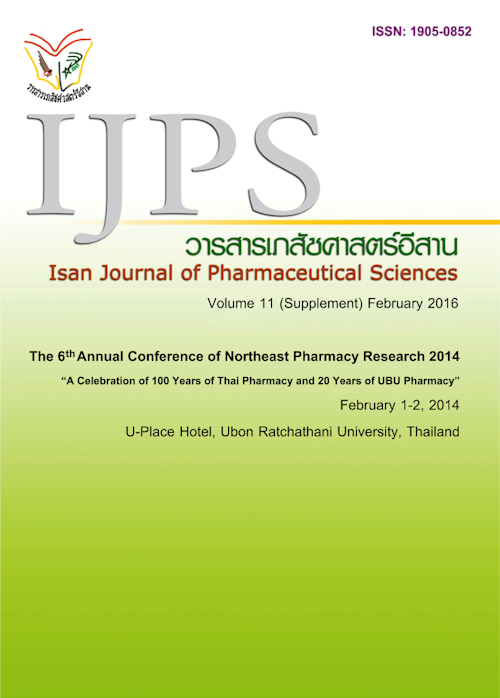Pharmaceutical Care Process Development in the Diabetes Patients at Kantharalak Hospital
Main Article Content
Abstract
Introduction: Pharmacy department aims to improve the quality of care for patients with diabetes by using pharmaceutical care. Due to the large number of patients and many procedures involved in real practice, complicated issues in pharmaceutical care have been arising. Pharmaceutical care cannot be covered to all patients completely so as the adequate services provided by the pharmacist. To solve the problems, we modify the process of data collection and expand the collaboration between pharmacy department and other healthcare disciplined teams. The objective of this research is to study the impact of pharmaceutical care in patients with type 2 diabetes which possess high Fasting Blood Sugar level (FBS) in respect of workload, self-care behaviors and FBS control. Materials and Method: Descriptive prospective analysis. Inclusion criterion were patients who have continued to have FBS levelof >200 mg/dl at least 2 consecutive times, have stable blood pressure, and patients who visited the Diabetic Care Unit between February and June 2013. Provide pharmaceutical care by two pharmacists to searching for specific problems, to educating and expanding to teams.T he patients were monitoring followed up every 35 days for 3 times. Results: Mean time for pharmaceutical care was 6.33 min (5-14 min). The pharmaceutical care was provided in 185 patients from 379 (44.8%), 127 patients were treated by the behavior change method (67.8%). The study found that the problems were ranging from No exercise (88.1%), No diet control (77.3%), and inappropriate medicine use (6.5%), forgot to take medicine (6.5%), drug default and/ or loss of follow up (6.5%) and lastly herb or food supplement use(3.2%). In the first follow-up the patients were found to have improved FBS of<150 mg/dl in 60 patients (33.4%). At the end of study, 70 patients (38.0%) had FBS of > 200 mg/dl, 20 patients (15.7%) whose treated by behavior change method achieved normal targeted FBS level (70-130 mg/dl), In total 26 patients (14.1%) achieved targeted FBS level. Conclusion: After modifying the processes of pharmaceutical care, pharmacy department can achieve 48.8% coverage of the pharmaceutical care. The diabetes patients improved their FBS level to 14.1%. However HbA1c should be monitored 1 times per year and other variables such as the relationship of proper medication prescribing or insulin resistance that leads to treatment outcome, these variables would be important to study further.
Article Details
In the case that some parts are used by others The author must Confirm that obtaining permission to use some of the original authors. And must attach evidence That the permission has been included


